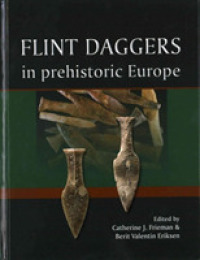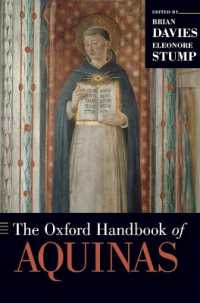Full Description
Christianity is widely understood to be a "universal" religion that transcends the particularities of history and culture, including differences related to kinship and ethnicity. In traditional Pauline scholarship, this portrait of Christianity has been justified by the letters of Paul. Interpreters claim that Paul eliminates ethnicity, or at least separates it from what is important about Christianity. This study challenges that perception.
Through a detailed examination of kinship and ethnic language in Paul's letters, Johnson Hodge argues that notions of peoplehood and lineage are not rejected or downplayed by Paul; instead they are
central to his gospel. Paul's chief concern is the status of the gentile peoples who are alienated from the God of Israel. Ethnicity defines this theological problem, just as it shapes his own evangelizing of the ethnic and religious "other." According to Paul, God has responded to the gentile predicament through Christ. Johnson Hodge details how Paul uses the logic of patrilineal descent to construct a myth of origins for gentiles: through baptism into Christ the
gentiles become descendants of Abraham, adopted sons of God and coheirs with Christ. Although Jews and gentiles now share a common ancestor, they are not collapsed into one group (of "Christians," for
example). They are separate but related lineages of Abraham. Through comparisons with other ancient authors, Johnson Hodge shows that Paul is not alone in his strategic use of kinship and ethnic language. Because kinship and ethnicity present themselves as natural and fixed, yet are also open to negotiation and reworking, they are effective tools in organizing people and power, shaping self-understanding and defining membership. If Sons, Then
Heirs demonstrates that Paul's thinking is immersed in the story of Israel. He speaks not as a Christian theologian, but as a first-century Jewish teacher of gentiles responding to concrete situations in
these early communities of Christ-followers. As such Paul does not reject or critique Judaism, but responds to God's call to be a "light to the nations."
Contents
Chapter One:: Patrilineal Descent and the Construction of Identities
Chapter Two:: Jews and Non-Jews: Paul's Ethnic Map
Chapter Three:: Reconstructing Gentile Origins: Adoption by the Spirit
Chapter Four:: Descendants of a Faithful Ancestor: Hoi Ek Piste=os
Chapter Five:: "All The Gentiles Will Be Blessed In You"
Chapter Six:: Formed After an Image: Procreative God in Romans 8:29
Chapter Seven:: Negotiating Multiple Identities
Chapter Eight:: Ranking Ethnic Peoples: "First the Jew, Then the Greek"








